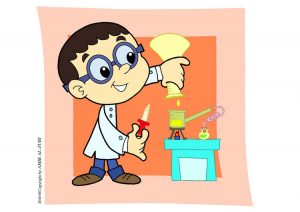science

All the theories, discoveries, inventions and technical applications that form the basis of our objective knowledge as it has developed in the course of history are called science.
Science: result of human endeavor
Science is the result of human endeavor in the service of human enterprise such as agriculture, cattle breeding, industry, trade, war, health care, exploitation and exploration. It was born from curiosity and necessity, and has reached a high level and extensive scope of influence in our time. It sometimes seems as if pure’ or ‘value-free’ science has detached itself from human goals. From this point of view a scientist is someone who makes totally neutral discoveries, develops theories and invents technical applications that may either be used to serve good or bad objectives. This holds a core of truth. A small part of science may be considered valueless. A good example is mathematics, a basic calculating system that is indispensable for all kinds of activities. But in general, most scientists are employed by a company or the state and are paid to perform a circumscribed task that fits within the business plan of the company or the policies of a government. Their work is not value-free, but goal-directed just like that of other employees.
Science: knowledge
Is it possible to attribute a purely positive value to science? Yes, insofar as one subscribes to the statement that objective knowledge in itself is a good thing. This statement has a long and venerable history. Jesus and Socrates both expressed the conviction that it is better to know than not to know. The highest form of knowing is a combination of experience, objective facts, coherence of statements, and something one could call ‘vision’, the ability to ‘see’ through appearances. Especially when we ourselves – our behaviour and emotions, our relationships with other people, the developments in our society – are at stake, objective knowledge is very important and valuable. This brings us to the difference between ‘natural science’ and ‘human’ science. The first is far ahead of the second. One of the reasons is that people have always been apprehensive of knowlegdge. Scientists were mistrusted and sometimes blamed for disasters. Even today, many people know little about science, are not interested in it, and even mistrust science. The ‘mad’ (natural) scientist who creates disasters and monsters is a stereotype in many warning tales, and doubtlessly not entirely fictitious.
Science as a quest for objective knowledge, has also often posed a threat to existing ideological explanations of the world, or religious and moral convictions, which are all linked with the exercise of power.
Science: history
The history of science shows that distant objects were investigated first, beginning with the stars, then plants and animal life, whereas the scientific study of ourselves is still in its infancy. This is due to the power of non-scientific forces in society, such as convictions and beliefs, judgements, emotions, power struggles, the need to survive. It is human psychology itself which resists self-knowledge or unwelcome insights into deeply held beliefs.
This is how science became the study of ‘nature’. This ‘nature’ became a collection of objects that were seen as separate from humans. Not only physics and chemistry, but biology as well, are still being taught in such a way that they seem to have little to do with human beings. Medical science, too, limits itself to the structure and functions of the ‘body’. In this way ‘man’ could continue to look upon himself as a separate and ‘spiritual’ being. Anything to do with human reason, conscience, spirit and soul, free will, philosophy, God, good and bad, responsibility, art, crime and punishment,etc. was kept out of ‘natural’ science
The idea that humans, too, can be studied like ‘natural’ beings, dawned in the 18th century, but still encounters a good deal of resistance. Human behaviour became an object of scientific study in economics, psychology and sociology. These are today still too restricted in scope to deserve the label ‘scientific’, except in certain respects or topics of study. Beliefs taught in universities, such as that man has a body and a spirit, stand in the way of adequate scientific theory and practice. Universities are still primarily social institutions of learning and teaching, which is a different world from that of scientific experiment and discovery. Not that the two do not meet, but the underlying fabric of the school is coloured by social forces, politics, religion, ruling opinions. Learned debates, even very vehement ones, tend to strengthen this character. Also, the university has generally been conservative and even hostile to the scientific claim to objective truth. The academic world, where philosophy and morality play an important part, has always nourished a critical approach to empirical science. Thus it may be useful to distinguish between ‘science’ and ‘school learning’. The latter is often wrongly called science as well. Both are needed and useful in society, but in different ways. To pursue this thought, let us consider the qualities of sexology. Does it deserve the name science?
